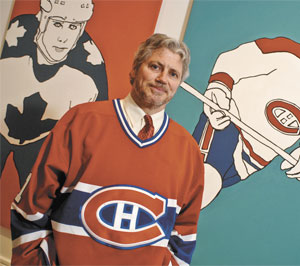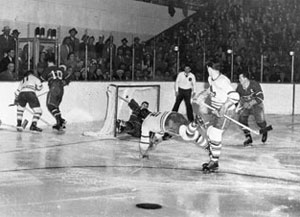 |
| Prof. Dave McNeil poses at the new hockey exhibition, ARENA, on at the Art Gallery of Nova Scotia. (Danny Abriel Photo) |
The moment that Professor David McNeil’s father lost the Stanley Cup in 1951 is frozen in time by a famous photo.
It was a highly charged face-to-face encounter during overtime. Gerry McNeil was the goalie for the Montreal Canadiens during the 1950-51 season.
In the image – one of several used by the professor to illustrate his course English 2060.03 “Sports Literature and Culture: Hockey” – the goalie looks behind his shoulder at the puck striking the mesh, propelled by “Bashing Bill” Barilko of the rival Toronto Maple Leafs.
It was April 21, 1951. Gerry’s wife was in hospital giving birth to their daughter that very day. Afterwards, a rumour persisted that he’d received an ominous telephone call, warning that a win would mean he’d never see his child. It wasn’t true; he never got that call but four months later, his rival Barilko vanished during a fishing trip when a floatplane crashed.
Gerry would go on to win the Stanley Cup with a 1-0 shutout in 1953 – something that students in English 2060 discover when they read Wayne Johnston’s The Divine Ryans.
His son David followed a love of reading to graduate school and joined the English Department at Dalhousie.
 |
| Bill Barilko scoring the overtime goal in 1951. (Hockey Hall of Fame) |
“When I told my father that I was switching from business to arts, he said: ‘I don’t care what you do, just try and do it the best you can,’” he recalls.
Students signed up for the first-time course offering are more likely to have heard the song Fifty Mission Cap, written 40 years later by The Tragically Hip, or to have seen the photo (held by the Hockey Hall of Fame) in several publications, as opposed to recalling events long before their time.
Fact and fiction, life and death, truth and other realities: this course examines how hockey shapes memory and meaning through novels, poetry, short stories, images, music and even YouTube videos. “Hockey is like improv theatre,” he says. “You never know what is going to happen in the moment.”
Today’s multimedia universe means these students can listen to excerpts from one of the first televised hockey games in November, 1952. The French network was first off the ground, with René Lecavallier providing the play-by-play from Montreal. (And, yes, David’s father played in that historic game.)
Often a topic in the news – such as when Richard Zednik’s throat was slashed by a teammate’s skate on February 10, 2008 – provides a starting point for the class. For awhile, this was one of the most viewed clips on YouTube. Prof. McNeil used this interest to explore the topic of danger in hockey and to probe its connection to the excitement and speed of the sport itself. He also asked the class to revisit the assumption that fighting is part of the game, given that many leagues ban fighting. “I like to challenge them to verbalize more in class. All perspectives are valid,” he says.
Innovative teaching methods are designed to engage the students. During the first class, the professor brought a wooden puck (from Windsor, the home of hockey, he notes) for a ceremonial face off. For the rest of the course, the puck became a reward for anyone who corrected a mistake, got a high score on the midterm or answered a question thoughtfully.
Students from a variety of disciplines, including kinesiology, commerce, computer science, science and arts, signed up for the course. A few hockey players were on the benches, from both men’s and women’s teams. The wide variety of perspectives added a lot to the discussions.
“The puck moved around quite a bit in some of those classes,” he laughs. “I tried to encourage competitiveness.”
On other occasions, guest speakers offered their interpretation of hockey and culture.
Students may have been surprised to be greeted by Matt Robinson, whom many know from Howe Hall, in his other guise as a poet. Mr. Robinson agreed to come in and discuss his original poem, The Zamboni Driver’s Lament. “He’s got a darker vision; he’s a more complex poet than many,” says Prof. McNeil.
For many, March 20 signals the imminent arrival of spring but for Prof. McNeil, it could only be Bobby Orr’s birthday, or a fitting occasion for another guest speaker – this time Stephen Brunt, author of Searching for Bobby Orr, and arguably one of the best sportswriters working today. Students listened intently and asked a barrage of questions afterward.
Arriving at the end of term, the class will be off to the Art Gallery of Nova Scotia for the opening of ARENA: The Art of Hockey. Prof. McNeil is keen to offer the course again next year and reports that students are signing up already.
“But for the summer, I get the puck back,” he adds.
Comments
comments powered by Disqus
